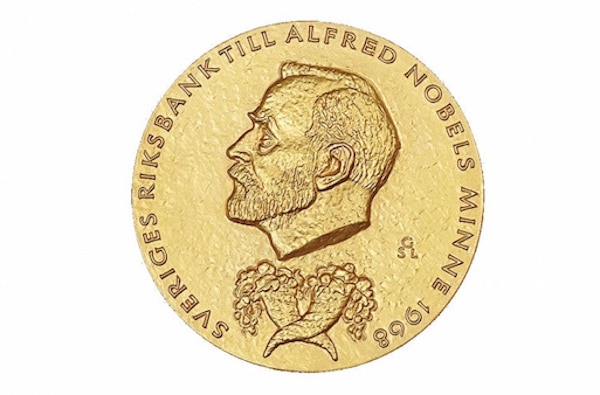Every year the Nobel Prize is awarded to different disciplines including Economics. And each year it generates a wave of euphoria and hype. But unlike literature and natural sciences, economics is the only social science where the Nobel is awarded. Even critical voices within the discipline get swayed by the hype of Nobel. Notwithstanding the problem of absolute marginalization of Blacks, Women and economists critical of Capitalism among award winners, there are other serious problems with Nobel Prize in Economics.
First of all, the Nobel Prize in Economics is not actually a Nobel Prize. The award in Economic sciences was not among the original set of disciplines included in the Nobel Prize in 1901. It was established by the Central Bank of Sweden (Sveriges Riksbank) in 1969, after 68 years, rather than by the Nobel Committee itself. The greatest irony is that this fact is mentioned even on the Nobel Prize website, which states, “The prize in economic sciences is not a Nobel Prize.” (NobelPrize.org, 2018). Hence contrary to all other Nobel prizes in different subjects/fields, the Nobel Prize in economics is called by the special name “Sveriges Riksbank Prize in Economic Sciences in Memory of Alfred Nobel”.Initially, members of the Nobel committee (including family members of Alfred Nobel) strongly objected to naming the prize given by the Central Bank of Sweden as the Nobel prize (Offer & Söderberg, 2016). To quote Alfred’s great-grandnephew Peter Nobel, “Nobel despised people who cared more about profits than society’s well-being. There is nothing to indicate that he would have wanted such a prize”, and deliberate association of Nobel prizes in Economics is “a PR coup by economists to improve their reputation” (The Local – Nobel Descendant Slams Economics Prize, 2005).
The prize initiated and awarded by the Central Bank of Sweden and falsely dubbed as the Nobel in Economics has acted as an institutional vehicle to endorse and establish Neo liberal ideas (mostly Free market fundamentalism) within Economics (Offer & Söderberg, 2016). In fact, member of the Nobel Award Committee for Economics are known to be affiliated with the notorious Mont Perlin Society (Mirowski, 2020). Notably, eight Mont Perlin Society members including Friedrich Hayek, Milton Friedman, George Stigler, Maurice Allais, James M. Buchanan, Ronald Coase, Gary Becker and Vernon Smith, have won Nobel. Economics, like other social sciences, such as, Political Science, Sociology, Philosophy, and Anthropology has diverse schools of thought and approaches to analyze and study the modus operandi of capitalism often euphemistically referred to as the ‘Economy’. In the last 68-years of its existence, not a single economist conducting rigorous theoretical and empirical research in the Marxian school of political economy has been a recipient of the award; such as, Paul Marlor Sweezy, Maurice Dobb, Samir Amin, Oskar Lange, Josef Steindl, Michał Kalecki, John Roemer, Anwar Shaikh, Prabhat Patnaik and similar others. The fact that the most deserving post-Keynesian economist Joan Robinson was never awarded the Nobel prize is not surprising. In contrast, that very Nobel Prize committee was generous enough to award it to researchers beyond economics including psychologist Daniel Kahneman, mathematician Lloyd Shapley and political scientist Herbert A. Simon. Such acts of exclusion by the selection committee demonstrate their entrenched ideological bias and built-in censoring mechanism against any scholarship critical of capitalism. The selective recognition of economists mostly from the schools favouring capitalism marginalizes all other schools critical of capitalism within the discipline of Economics.
Furthermore, the pseudo–Nobel Prize in economics unnecessarily creates ‘Spokesperson(s) of the subject’ when ideally, they shouldn’t even exist (Offer & Söderberg, 2016). By awarding economists mostly from the Neo-classical schools, it not only tends to reduce diversity within the subject, but also arbitrarily produces Spokesperson(s) for the subject. The common public, media, universities, and policymakers are thus inordinately influenced by the opinions and suggestions given by the Nobel winners. Economics is a very policy-oriented subject, dealing with decisions such as Taxation, Subsidies, Government expenditures, Regulation etc. The creation of such spokespersons dominantly from Neoclassical school and their inherent bias in favor of the free market (pro-big business) policies and aversion against Welfare state policies can have adverse impact on the everyday lives and livelihood of ordinary people. Media and government often utilize the views of such Nobel winners to justify policies that negatively impact the working class and ordinary people. These policies include dismantling pro worker labor legislations, privatization of public sector companies, tax-cuts to corporates, reducing funds for social sectors, increasing indirect taxes, deregulation of financial institutions, etc. Such policies disproportionately benefit transnational corporates and capitalist class across the world. For instance, the Nobel laureate Milton Friedman was comfortable the illegal coup of democratically elected president Salvador Allende and actively supervised the neo-liberal economic policies of Dictator Pinochet in Chile (Fischer, 2009; Frank, 1976; Klein, 2007). The ideas of several Nobel Laureates such as the Efficient Market Hypothesis, Black- Scholes formula, as well as positions in favour of market deregulation, especially the financial market, and the presumed magical efficiency of unregulated markets led to the greatest economic disaster of our generation i.e. the Great Financial Crisis of 2007 (Bresser-Pereira, 2010; Crotty, 2017). And therefore, quite evidently, the pseudo-Nobel in economics stifles diversity of thought within economics, tends to manufacture spokesperson(s) of the discipline (with of course a pro-market outlook), and has increasingly turned into an institutional mechanism to promote and legitimize Neo-liberal policies throughout the World.
Moreover, recipients of the pseudo- Nobel Prize in economics have mostly been concentrated in few Universities of the Global North. The majority of Nobel awardees are from a handful of North American universities (Totska, 2023). Nearly 46 % of the 96 recipients of the Nobel in economics between 1969 to 2024 were affiliated with just four Universities of USA, namely, University of Chicago, Massachusetts Institute of Technology, Harvard University and Princeton University. It represents only 0.12% of all Universities in the USA, 0.02% in Europe, or 0.00012% of all Universities in the world. Research has shown that most PhD students in economics of the Ivy League universities, where Nobel is concentrated, are from economically and socially privileged backgrounds (Stansbury & Schultz, 2023). Furthermore, Nobel prize winners in Economics are connected through a tight network of professor-student relationships (Tol, 2022) and the possibility of nepotism can hardly be ruled out (Zuckerman, 1977). This finding is not surprising given the fact that the Nobel Prize selection committee allows previous Nobel Laureates to nominate a candidate for the subsequent years (NobelPrize.org, 2018) and getting nominated by a previous awardee dramatically increases the chances of receiving the Prize (Economist Data Team, 2021). By summarily excluding knowledge produced by the Global South, while concentrating on few universities of just one country from the North, where the discipline is mostly pursued by individuals from privileged socio-economic backgrounds, the Nobel Prize further accentuates exclusionary tendencies prevalent within this subject and entrenches monopolization of knowledge production by a few centres in the global North and makes decolonization of economics nearly impossible.
As far as this year’s Nobel in economics is concerned, it was awarded to three economists: Daron Acemoglu (MIT), Simon Johnson (MIT), and James Robinson (University of Chicago). According to the Nobel committee, they were selected for it because they were “able to demonstrate a relationship between institutions and prosperity. They have also developed theoretical tools that can explain why differences in institutions persist and how institutions can change.” It is difficult to review the entire corpus of work done by Acemoglu et al here, so a brief review of their most influential (cited) works is presented here at a very high level of generality. Kvangraven et al., (2024) have also recently critiqued Acemoglu’s work for which he was awarded Nobel this year. Acemoglu’s work falls largely under the New Institutional Economics school and has shown the importance of institutions (social-legal rules/norms governing/influencing economic behaviours) in a country’s economic growth or decline. The crux of their research is figuring out correct institutions for economic prosperity. But if one interrogates the kind of institutions being sought, it becomes apparent, that they are mostly those which enable or entrench the rule of private bourgeois property, that in turn, enhances market functioning and outcomes. In their paper, “The Colonial Origins of Comparative Development: An Empirical Investigation – American Economic Association”, they even argue that depending on the type of institutions (extractive or inclusive) set up by colonialists, ex-colonial countries will have different economic consequences in the post-colonial period. However, what their research fails to acknowledge is that it was precisely the web of intricate institutional mechanisms designed by colonialism that allowed for the unilateral expropriation and transfer of wealth from the Global South (ex-colonies with extractive institutions), allowing them to accumulate enormous wealth in the Global North (settler colonies with supportive institutions) while forcing ex-colonies to be economically dependent and poor (Amin, 1988; Frank, 2013). From 1765 to 1938, the transfer of wealth from Indian colony to UK amounted to $45 trilion( Patnaik, 2017) and such drain of wealth from Global South to global North is estimated around $242 trillion from 1990 to 2015 (Hickel et al., 2022).
Acemoglu et al fail to acknowledge the complex historical and contemporary mechanism of neo-colonialism where the development of the North is pre-conditioned on the underdevelopment of the South (Amin, 1988), the structural constraints imposed on domestic policy space of states of the South (with extractive institutions) by Global financial capital (Patnaik, 2005, 2018) and inability to comprehend capital accumulation as autonomously determined global scale process (Grinberg, 2018). Additionally, Daron Acemoglu argues that all non-capitalist institutional solutions provided under socialism such as economic planning, coordination, nationalisation are “extractive” institutions. Many ex-colony countries, such as India and China, were able to foster industrialization through extensive use of extractive institutions, such as public ownership of private commercial banks and financial institutions and, the use of comprehensive economic planning. Nonetheless, Daron supports mildly social democratic solutions such as minimum wage, breaking monopolies, reducing inequality, unionism, favouring greater democracy, addressing the adverse impact of AI on workers etc. but all within the realm of capitalism. Hence, Acemoglu (and others) getting the Nobel is another example of validating researchers whose research does not challenge the status quo of capitalism.
Capitalism is posing a real existential risk to humanity, generating unprecedented inequality, subjecting common people to harsh neo-liberal austerity, and consequently emboldening right-wing neo-fascists in Europe, America and elsewhere. At this historical juncture, the celebration of Nobel Prize in economics, which legitimizes apologists of Capitalism and silences its critique puts even Nero to shame. Hence, it’s high time we end fetishising the Nobel Prize in economics and demand what Gunnar Myrdal did 50 years ago, that is, seek the abolition of Nobel Prize in economics (Brittan, 2009).
Dr. Dawa Sherpa is Assistant Professor in the Department of Economics, Kurseong College, University of North Bengal, India.
References
Acemoglu, D. (2005). Institutions as the Fundamental Cause of Long-Run Growth. Handbook of Economics Growth.
Acemoglu, D., Johnson, S., & Robinson, J. A. (2001). The colonial origins of comparative development: An empirical investigation. American Economic Review, 91(5), 1369–1401.
Acemoglu, D., & Robinson, J. A. (2013). Why nations fail: The origins of power, prosperity, and poverty. Crown Currency.
Altman, M. (2004). The Nobel Prize in behavioral and experimental economics: A contextual and critical appraisal of the contributions of Daniel Kahneman and Cernon Smith. Review of Political Economy, 16(1), 3–41.
Amin, S. (1988). Accumulation on a World Scale: Thirty Years Later. Rethinking Marxism.
Brittan, S. (2009, June 30). The not so noble Nobel Prize – Samuel Brittan: The Financial Times 19/12/03.
Crotty, J. (2017). The Realism of Assumptions Does Matter: Why Keynes-Minsky Theory Must Replace Efficient Market Theory as the Guide to Financial Regulation Policy. In Capitalism, Macroeconomics and Reality (pp. 13–38). Edward Elgar Publishing.
Economist Data Team. (2021). The best way to win a Nobel is to get nominated by another laureate. The Economist, 1.
Fischer, K. (2009). The Influence of Neoliberals in Chile before, during, and after Pinochet. The Road from Mont Pèlerin: The Making of the Neoliberal Thought Collective, 305–346.
Frank, A. G. (1976). Economic genocide in Chile: Open letter to Milton Friedman and Arnold Harberger. Economic and Political Weekly, 880–888.
Frank, A. G. (2013). The development of underdevelopment. In Sociological Worlds (pp. 135–141). Routledge.
Grinberg, N. (2018). Institutions and Capitalist Development: A Critique of the New Institutional Economics. Science & Society, 82(2), 203–233.
Hickel, J., Dorninger, C., Wieland, H., & Suwandi, I. (2022). Imperialist appropriation in the world economy: Drain from the global South through unequal exchange, 1990–2015. Global Environmental Change, 73, 102467.
Klein, N. (2007). The Shock Doctrine: The Rise of Disaster Capitalism. Metropolitan Books.
Kvangraven, Ingrid Harvold, and Surbhi Kesar Devika Dutt.2024. The Colonial Origins of Economics. Economic and Political Weekly. Vol. 59, Issue No. 42
MacLean, N. (2017). Democracy in Chains. The Deep History of the Radical Rigth’s Stealth Plan for America. (No Title).
Maxton, G., & Randers, J. (2016). Reinventing prosperity: Managing economic growth to reduce unemployment, inequality, and climate change. Greystone books.
Mirowski, P. (2020). The neoliberal Ersatz nobel prize. Nine Lives of Neoliberalism, 219–254.
Myrdal, G. (1977). The Nobel Prize in Economic Science. Challenge, 20(1), 50–52.
Nature. (2024). Nobel prizes are globally unrepresentative—The nomination process must be opened up. Nature, 634(8033), 266–266.
NobelPrize.org. (2018, July 4). Nomination and selection of economic sciences laureates. NobelPrize.Org. https://www.nobelprize.org/nomination/economic-sciences/
Offer, A., & Söderberg, G. (2017). The Nobel Factor: The Prize in Economics, Social Democracy, and the Market Turn. Princeton University Press.
Patnaik, P. (2018). Reflections on contemporary capitalism. The Changing Face of Imperialism. New York and Oxford: Routledge, 15–36.
Patnaik U. (2017). Revisiting the ‘Drain,’ or transfers from India to Britain in the context of global diffusion of capitalism. In Chakrabarti S., & Patnaik U. (Eds.), Agrarian and other histories: Essays for Binay Bhushan Chaudhuri. Tulika Books.
Stansbury, A., & Schultz, R. (2023). The Economics Profession’s Socioeconomic Diversity Problem. Journal of Economic Perspectives, 37(4), 207–230.
The Local—Nobel descendant slams Economics prize. (2005, September 28).
Tol, R. S. J. (2022). Rise of the Kniesians: The professor-student network of Nobel laureates in economics. The European Journal of the History of Economic Thought, 29(4), 680–703.
Tol, R. S. J. (2023). Nobel begets Nobel (arXiv:2207.04441).
Tol, R. S. J. (2024). The Nobel family. Scientometrics, 129(3), 1329–1346.
Totska, O. L. (2023). Nobel Prize in Economics: Retrospective analysis and prediction of laureates. Journal of Management & Technology [Revista Gestão & Tecnologia], 23(2), 10–28.
Zuckerman, H. (1977). Scientific Elite: Nobel Laureates in the United States. The Free Press.
Publisher: Source link











